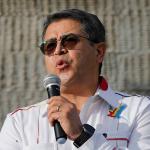US Helped Turn Honduras Into a Narco-State. Hold Obama, Trump and Biden Accountable

Ex-president of Honduras Juan Orlando Hernández, popularly known as JOH, was convicted Friday in federal court in New York on drug trafficking and weapons charges. JOH rose to power after a 2009 coup. He was president from 2014 to 2022, stealing at least one and possibly three elections. He and his brother Tony (convicted on drug charges in 2019) allegedly made deals with the murderous MS-13 gang and grew rich from the drug trade. Honduras became a narco-state riddled with corruption, violence, human rights violations and extreme poverty.
The Drug Enforcement Administration had strong evidence since 2013 that the Hernandez brothers were making Honduras the primary transfer point for cocaine between Colombia and the United States. The U.S. likely knew JOH’s associates were working with Mexican drug lord El Chapo Guzman as early as 2011. In 2016 El Chapo gave JOH a million-dollar campaign contribution through brother Tony.
From 2009 to the present, my organization, the Kansas City-based Cross Border Network, conducted six human rights delegations to Honduras. We went to Ahuas to interview survivors of an operation where U.S. helicopters with DEA agents and Honduran police on board opened fire on a boatload of native river passengers, killing four and seriously wounding four others, mistaking them for narco-traffickers. They left the wounded and dead in the river for hours, and the DEA never compensated wounded survivors and orphaned children. Instead, the agency lied about the incident.
We visited a maximum-security prison, La Tolva, which the U.S. had encouraged Honduras to build to house gang members, but JOH also sent arrested protesters of his fraudulent 2017 election there to await trial. They were terrorized by the gangs while deprived of food and clean water.
We talked to dozens of women garment workers for companies such as Hanes who are so disabled with repetitive strain injuries from punishing production quotas that they can’t pick up a toddler or sweep the floor. These U.S. corporations benefited from free trade agreements with labor rights provisions that neither JOH nor the U.S. cared to enforce.
We met with numerous farmers and native groups whose land was stolen by palm oil corporations and real estate developers selling homes in paradise to unsuspecting snow birds from North America.
We even met with one Honduran Navy colonel who said the drug war was just a game of whack-a-mole. Meanwhile, his troops — trained by both U.S. and Colombian military — after a drunken holiday party fired on two cars filled with native youths stuck in a sand dune, killing one and injuring others.
The DEA, State Department and three presidents all backed JOH every step of the way with weapons, police and military training and millions in foreign aid. Why didn’t they stop when they knew Hernández had turned Honduras into a narco-state? Using the drug war as an excuse, the U.S. expanded its military bases and imperial control over Central America and the Caribbean. It facilitated U.S. corporations’ extraction of cheap resources and exploitation of cheap labor.
Media covering JOH trial isn’t highlighting the United States’ role as enabler to JOH, and is protecting Presidents Barack Obama, Donald Trump and Joe Biden from accountability for the thousands killed, maimed and jailed, let alone the tens of thousands of Hondurans who fled for sanctuary in the U.S.
The Honduras Solidarity Network wants accountability. We are calling for declassification of documents, congressional investigations and reparations for victims of the DEA massacre at Ahuas, and we want the U.S. to stop interfering in the current government’s efforts to repair the damage that JOH did. Only that will actually get to the root of Honduran migration. For information about our campaign Putting the U.S. and Canada on Trial, go to HondurasNow.org
[Judy Ancel is a labor educator and producer of the Heartland Labor Forum on community radio KKFI in Kansas City. For 30 years, she has worked to build international labor solidarity through the Cross Border Network, which has been taking labor and human rights delegations to Honduras since 2009.]
